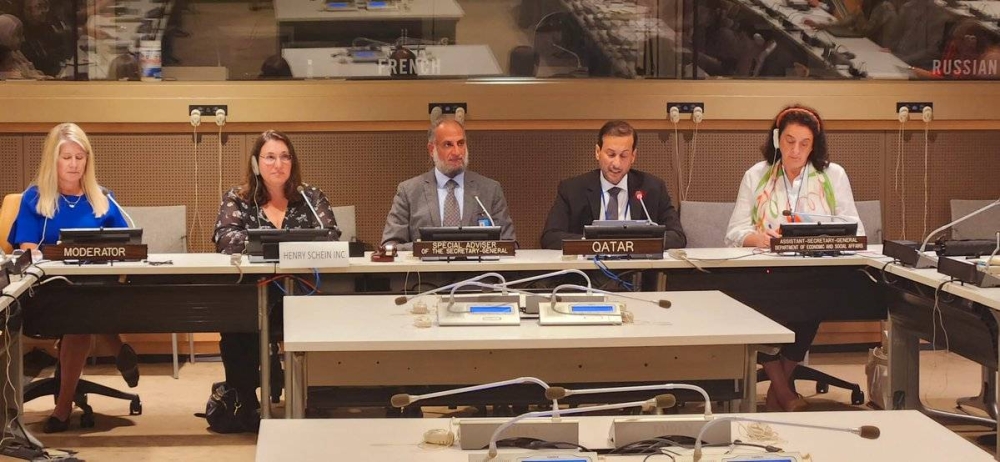The State of Qatar has affirmed its developmental and humanitarian assistance efforts are rooted in its 2030 National Vision, noting it aligns with its global peace, security and development commitments, guided by the 2030 Agenda for Sustainable Development principles, recognising the transformative capabilities inherent in partnerships between the public and private sectors.
This came in a speech by HE the Director of the International Co-operation Department at the Ministry of Foreign Affairs Shaheen Ali al-Kaabi, during the discussion of a roundtable, organised by Qatar on re-defining partnerships between the public and private sectors and the 17th goal of sustainable development in humanitarian response. The roundtable was organised in partnership with the office of HE Special Adviser to the UN Secretary-General Dr Ahmed al-Muraikhi. It was held on the sidelines of a high-level political forum, at the UN headquarters in New York, with the participation of Maria Francesca Spatoleso, who is the Assistant UN Secretary-General for Policy Coordination and Inter-Agency Affairs in the Department of Economic and Social Affairs.
Al-Kaabi said that Qatar was pleased to host the discussion, adding that it was highly important given its focus on the private sector's effective participation in responding to emergency. He affirmed that Qatar looks forward to working closely with multilateral agencies and the private sector to face global challenges, enhance international cooperation, respond to humanitarian crises, contribute to achieving the goals of sustainable development by exploiting these partnerships to provide customised aid, financial assistance, and strategic support for emergency programs for the benefit of local communities around the world.
He pointed out that Qatar has been continuously providing humanitarian and development assistance at the bilateral and multilateral levels, through the UN all over the world, especially to developing countries facing crises and natural disasters, explaining that this support comes through the Department of International Development at the Ministry of Foreign Affairs and the Qatar Fund for Development.
In this regard, he said that Qatar announced in 2018 support for the core resources of the UN with a total amount of $500mn, which in itself is clear evidence of its commitment to multilateralism and global solidarity.
The long-standing partnership of Qatar with the UN Office for the Co-ordination of Humanitarian Affairs continues to play a key role in strengthening preparedness and emergency response efforts, finding solutions to humanitarian and relief crises, and making large financial contributions to the humanitarian response funds of the UN Office for the Co-ordination of Humanitarian Affairs, including the Central Emergency Response Fund and the Yemen Humanitarian Fund.
He also pointed out that Qatar has become a member of the Advisory Board of the Central Emergency Response Fund, thanks to the large humanitarian contributions it has made, the total of which has so far reached nearly $20mn.
Al-Kaabi praised the partnership between the Qatar Fund for Development and the Education Above All Foundation, which aims to improve education for millions of children and youth, and their access to it in countries affected by crises, as more than 70 countries have benefited from the contributions of Qatar, which invested investments exceeding $1bn, which included building schools, universities and kindergartens, supporting teachers, publishing curricula materials and books, and providing scholarships to students from developing countries.
He stressed that these efforts were accomplished through strong cooperation with UN agencies, national and international organisations, and with private sector entities.
He referred to the partnership between the government of Qatar, the Qatar Fund for Development, Qatar Charity, the Qatar Red Crescent Society, and the private sector in the State, to provide humanitarian relief contributions around the world during the outbreak of the coronavirus pandemic (Covid-19), as the total governmental and non-governmental financial assistance provided by Qatar exceeded $256mn, distributed to about 88 countries, and assistance was provided to the World Health Organisation, Unicef, and the UN High Commissioner for Refugees.
In this context, he pointed out that the State of Qatar provided $20mn to support the GAVI Vaccine Alliance, and the Qatar Fund for Development committed $10mn to support the pre-market commitment of the COVAX and GAVI facility, which aimed to purchase 1.3bn vaccine doses by the end of 2021.
Al-Kaabi said that the co-operation of Qatar with Islamic financial institutions to address urgent humanitarian challenges through Islamic financing mechanisms represents an ideal partnership in Qatar's efforts in the field of humanitarian response.
He noted that Qatar has created funds and tools dedicated to mobilising resources by establishing innovative partnerships with Islamic banks and institutions. He added that Qatar's unique approach allowed it to direct funds towards critical humanitarian projects, including the construction of health care facilities, schools and infrastructure for displaced communities.
Al-Kaabi stressed that this type of partnership not only allows Qatar to mobilise resources, but also provides an alternative path in order to provide effective and socially responsible humanitarian assistance.
He also stressed the importance of taking into account public-private partnerships, empowering and building the capacities of local actors, including governments, civil society, women's groups and private entities, which are critical to achieving an effective and context-sensitive humanitarian response.
He said that achieving long-term development and resilience lies in the involvement of stakeholders in decision-making and implementation processes.

